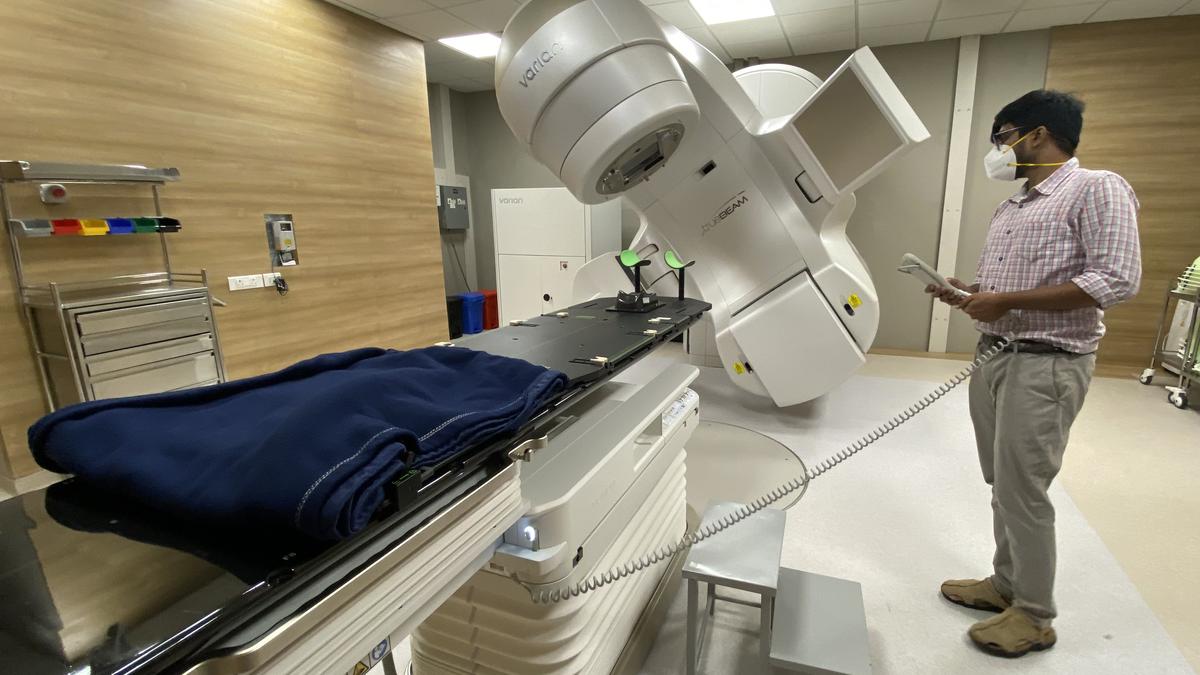Science
Advancements in Personalized Radiation Therapy for Cancer Patients

Radiotherapy is a crucial component in the treatment of cancer, employing high-energy ionizing radiation to combat both malignant and certain benign conditions. In India, many patients present with advanced cancer due to a lack of awareness and insufficient screening programs. As a result, approximately 70% of cancer patients require radiotherapy as part of their treatment, often in combination with surgery, chemotherapy, and other therapies.
The landscape of radiotherapy has evolved significantly in recent years, with new technologies enhancing treatment precision. There are two primary modalities in radiotherapy: teletherapy, which utilizes external beams of radiation, and brachytherapy, where radiation sources are placed directly in or near the tumor. Both methods aim to deliver effective doses while minimizing damage to surrounding healthy tissue.
Technological Advances in Radiotherapy
Over the past two decades, advancements in hardware and software have enabled high-precision radiation delivery. Techniques such as Intensity Modulated Radiotherapy (IMRT) and Image Guided Radiotherapy (IGRT) allow for targeted treatments that spare healthy tissue while effectively addressing tumors. The introduction of proton therapy in India has further enhanced treatment capabilities, offering specific dosimetric advantages and reducing complications, particularly in pediatric patients.
Despite these advancements, challenges remain. Not all patients respond to radiotherapy, with treatment outcomes varying significantly due to individual tumor characteristics and genetic factors. This variability underscores the need for personalized treatment protocols that consider each patient’s unique biological makeup. Current treatment guidelines often rely on average responses, which do not account for individual differences in genetics or lifestyle.
There is a pressing need for research to develop predictive markers that can identify patients likely to respond to treatment and those at risk of severe side effects. Innovative approaches are necessary to enhance the effectiveness of radiotherapy while reducing toxicity.
Towards Personalized Radiotherapy
Recent developments in molecular oncology and artificial intelligence (AI) are bringing the concept of personalized radiotherapy closer to reality. Researchers are utilizing AI and deep learning models to analyze vast amounts of data related to tumor behavior and treatment responses. This data-driven approach aims to identify predictors of radiation sensitivity, leading to more tailored treatment plans.
Several areas of research are contributing to this goal. Digital pathology enhances case referrals between healthcare providers, allowing for quicker expert opinions. Radiomics analyzes imaging patterns to predict treatment outcomes, while genomics and proteomics are being integrated to develop comprehensive tumor biology panels. These advancements can lead to more effective and personalized cancer treatment strategies.
AI-driven adaptive radiotherapy is also emerging as a revolutionary method. This approach utilizes real-time imaging to adjust treatment plans based on daily changes in tumor geometry, improving targeting and minimizing damage to healthy tissues. Additionally, research into nanoparticle technology aims to deliver drugs directly to tumors, enhancing treatment efficacy.
The integration of daily PET CT scans in adaptive radiotherapy is another promising development, providing functional information that complements anatomical data and refining treatment plans.
While significant strides have been made, further validation is necessary to incorporate these innovations into routine clinical practice. The journey toward personalized radiotherapy is ongoing, but the advancements achieved thus far indicate a promising future for cancer treatment. As noted by Dr. K. Satish Srinivas, Professor and Head of the Department of Radiation Oncology at SRIHER, Chennai, the dream of personalized radiotherapy may soon transition from laboratory research to everyday practice in oncology.
-

 World5 months ago
World5 months agoSBI Announces QIP Floor Price at ₹811.05 Per Share
-

 Lifestyle5 months ago
Lifestyle5 months agoCept Unveils ₹3.1 Crore Urban Mobility Plan for Sustainable Growth
-

 Science4 months ago
Science4 months agoNew Blood Group Discovered in South Indian Woman at Rotary Centre
-

 World5 months ago
World5 months agoTorrential Rains Cause Flash Flooding in New York and New Jersey
-

 Top Stories5 months ago
Top Stories5 months agoKonkani Cultural Organisation to Host Pearl Jubilee in Abu Dhabi
-

 Sports4 months ago
Sports4 months agoBroad Advocates for Bowling Change Ahead of Final Test Against India
-

 Science5 months ago
Science5 months agoNothing Headphone 1 Review: A Bold Contender in Audio Design
-

 Top Stories5 months ago
Top Stories5 months agoAir India Crash Investigation Highlights Boeing Fuel Switch Concerns
-

 Business5 months ago
Business5 months agoIndian Stock Market Rebounds: Sensex and Nifty Rise After Four-Day Decline
-

 Sports4 months ago
Sports4 months agoCristian Totti Retires at 19: Pressure of Fame Takes Toll
-

 Politics5 months ago
Politics5 months agoAbandoned Doberman Finds New Home After Journey to Prague
-

 Top Stories5 months ago
Top Stories5 months agoPatna Bank Manager Abhishek Varun Found Dead in Well









